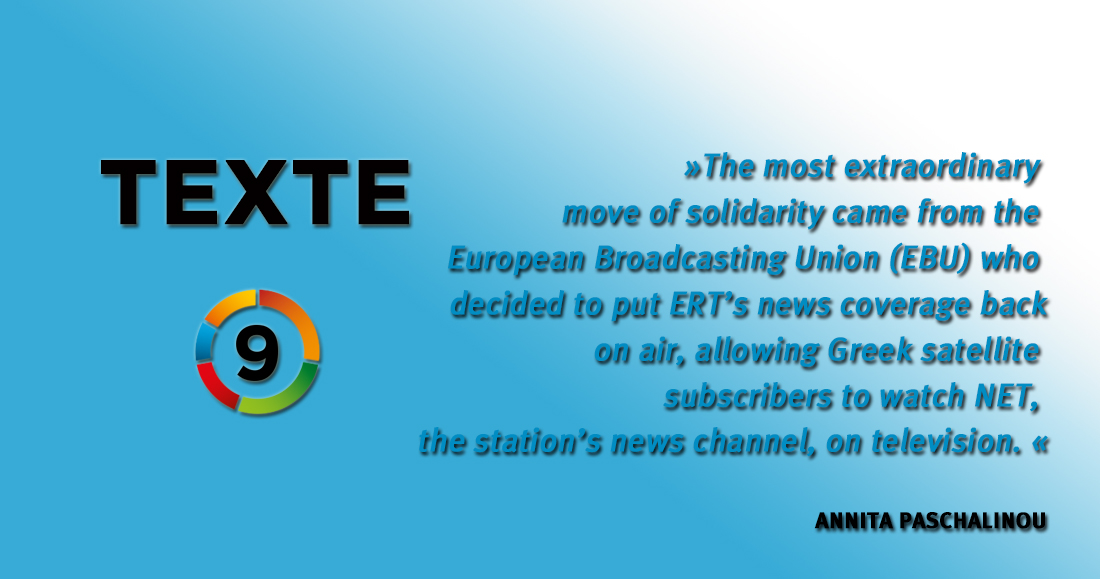[Eine Seite zurück]
View from the inside: the «succERT» story
Annita Paschalinou, digital news, ERT
It could be characterized as a tragic irony. The ERT website (www.ert.gr), the digital arm of the Public Broadcasting Corporation, the third and inherently dynamic medium that was spreading a powerful brand name since April 2000, was the last created and the last that fell dead following the Greek government’s controversial decision to shut down the Greek public broadcaster. This has been achieved, thanks to the democratic nature of its medium, thanks to the internet.
The notice “under construction” on ERT’s website came some hours later. Additionally, the Greek government was too slow to register the new domain name („nerit.gr“); the news blog which claimed it first streamed a live feed of the “ERT occupied program”. “Nerit.gr” became a big story in major media all over the world, internationally embarrassing the Greek government. The patenting of the domain name by a private citizen crushed the government’s arguments for an organized plan to replace ERT and proved that no preparation had taken place. A few days later, the government again provoked dismay by shutting down www.nerit.gr without explanation and even though the news blog that claimed it first had followed all necessary legal procedures. Today,
a month after the controversial decision to shut down ERT, the domain name ”ert.gr” appears to be in use on the official records, but it is unknown by whom. But how did the story begin?
The days after the night of crisis (code name “11/6”), ERTS‘s staff, journalists and technicians were ready to stand and fight under tough conditions, such as uncertainty and intense emotional ups and downs. Crying for the lost signal of democracy quickly changed into inspiration. The self management of the Public Broadcasting Corporation was a great challenge to all of us who had the unique opportunity to operate without political intervention for the benefit of Greek society.
At the beginning, journalists and technicians of ERT had to deal with a lot of problems. Then came the solutions: The prestigious National Technical University restored the internet connection and in consultation with PCC, the biggest power producer in the country, the provision of electricity was set. Journalists and technicians were using their mobile phones (paid on their own, not by the company, as wrongly claimed by politicians) to restore communication. The most extraordinary move of solidarity came from the European Broadcasting Union (EBU) who decided to put ERT’s news coverage back on air, allowing Greek satellite subscribers to watch NET, the station’s news channel, on television. In its announcement, the EBU underlined that it will maintain ERT‘s TV and radio frequencies via live stream on the EBU website until a public national broadcaster is able to resume full service to domestic audiences. In the meantime, hundreds of Greek sites and blogs defying the Ministry of Finance on penalties created an Intranet for ERT and were transmitting its program. And while the whole world watched the self-governed Public Broadcasting, there circulated a counterfeit issue of the (in Greece well known) ERT’s print magazine “Radioteleorasi”. It was a bad imitation, a haphazard and a low quality copy of the original “Radioteleorasi” layout – some said, done with the only purpose to get the Greek public’s money.
From www.ert.gr to www.ertopen.com
The gap in news coverage until the transition to “www.ertopen.com” was filled instantaneously, since the internet connection was restored, thanks to social media. Self-managed journalists at “www.ert.gr” became highly qualified social media editors, who provided ERT’s accounts on Facebook, twitter and YouTube to publish all of the news & audio content via social media. From the very first moments of crisis till now, the audience strongly approved the self-governed ERT project. Encouraging – and referred to the fact, that the blackout on ERT’s frequencies was a distinct cut of the umbilical cord with governmental and political interventions. We put an end to the skillful embellishment of reality, and
for the first time, we were functioning in coordination with public sentiment. Over the Internet, the self-governed ERT gained extraordinary ground. This was not only a matter of likes and followers on ERT’s social accounts on Facebook or twitter. It is interactivity that matters most. On Facebook, ERT’s account today is swarmed by posts, messages and comments, while the content is read and shared by thousands of users in a few minutes. On twitter, #ERT and #mysocialert were -- along with #occupygezi (Turkey) -- the most popular issues during the first weeks of crisis. When “ertopen.com” came back on the air, users were already aware that this was the voice of the self-managed ERT over the Internet. A story of success which shows people know that independent journalism, produced by an accountable public broadcaster is inevitable. •
This article was published in "TEXTE 9 - Why Greece matters" (2013)
